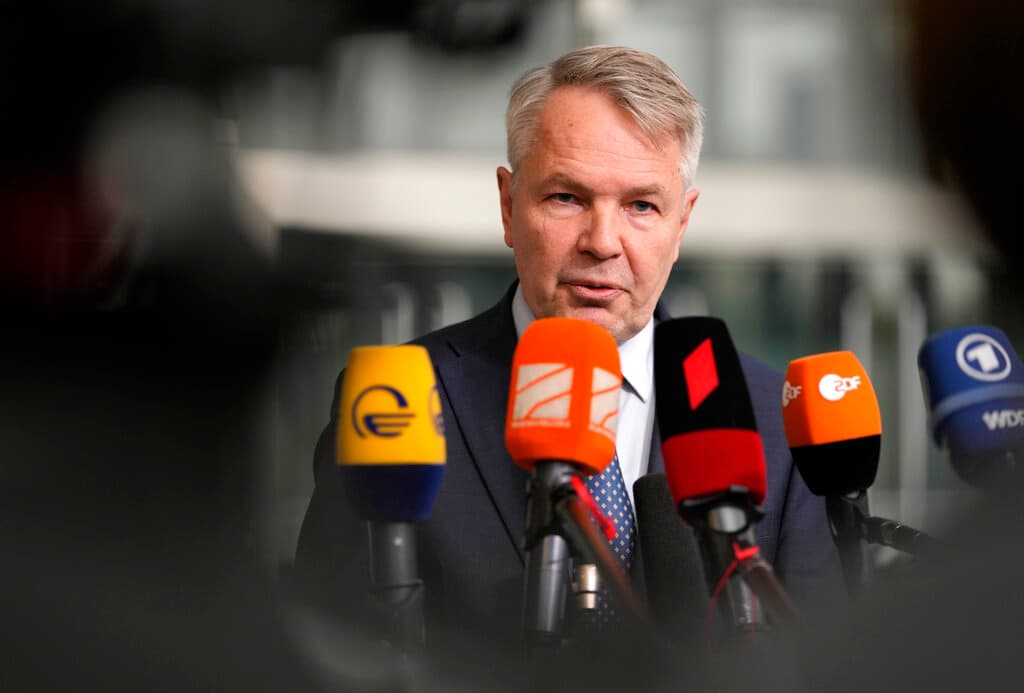Finland, Rattled by Russia’s Invasion of Ukraine, Thinks the Unthinkable — NATO Membership
The government’s efforts broadly reflect Finnish public sentiment. Some 60 percent of Finns now support NATO membership — a 53 percent increase from when the war began.

For most Finns, the prospect of their country joining the North Atlantic Treaty Organization had long been virtually unthinkable. While Finland had moved closer to the military alliance over the last three decades, it had resisted the idea of becoming a full-fledged member.
That all changed when Vladimir Putin sent ten thousand tanks into Ukraine. Now Finland’s government is preparing to amend a security white paper that would lay the groundwork for the country’s application to NATO. The paper is set to be presented before the parliament on April 14, with a decision on membership anticipated in May, if not sooner.
The government’s efforts broadly reflect Finnish public sentiment. Some 60 percent of Finns now support NATO membership — a 53 percent increase from when the war began.
Finland’s shift — following decades of nonalignment — is a significant change in Europe’s security environment, one that could drastically alter the map between Russia and the West. Finnish participation in the security alliance would more than double the total land border between NATO territory and Russia — to nearly 1,600 miles from some 754 miles.
This would extend NATO’s northern flank across the full length of Russia’s strategic Kola Peninsula and Murmansk region, where a sizable chunk of Russia’s navy is based. Such an expansion would also significantly reconfigure Europe’s Nordic region, giving it the requisite strategic depth and bolstering its overall security — as well as that of Baltic nations.
An eventual NATO membership for Finland could also pave the way for Sweden to follow suit. While slower to adapt to the changed geopolitical reality, Sweden has been steadily moving in the same direction. The Swedish Social Democratic Party, traditionally one of military neutrality, has begun to shed its historical skin. Mr. Putin’s brutality has shattered any illusions regarding cooperation with the Moscow regime.
The question of NATO membership is likely to be a significant factor ahead of the Swedish general election scheduled for September. The country’s Moderate Party has already signaled its support for membership in the military alliance.
The prospect of Finland and Sweden joining the North Atlantic Treaty Organization is likely to further inflame tensions between Russia and the West. The Kremlin’s press secretary, Dmitry Peskov, has said that if Finland joins NATO, Moscow will “rebalance the situation.”
“We will have to make our western flank more sophisticated in terms of ensuring our security,” Mr. Peskov told Britain’s Sky News. The Kremlin last month also warned of “serious military and political consequences” should Finland and Sweden join NATO.
Finland’s eventual membership in the North Atlantic Treaty Alliance would have to be approved by its parliament, likely in a two-thirds majority vote. Yet this is likely to be but a formality. Finland’s Social Democrats as well as the conservative Centre Party have both moved toward a favorable position on NATO membership. For Finland, the stakes are now much too high.
For Europe, they are equally so. With the likely exception of Poland and several Eastern European states, few countries appreciate better than Finland how Russia works. Including Helsinki’s experience in balancing relations with Moscow would add significant value to the military alliance. It would, as the Heritage Foundation’s Daniel Kochis noted, also erase doubts over the alliance’s planning for the Baltic theater.
If Finland wishes to join the alliance, “we will find a way to make it happen quickly,” NATO’s secretary-general, Jens Stoltenberg, said.

